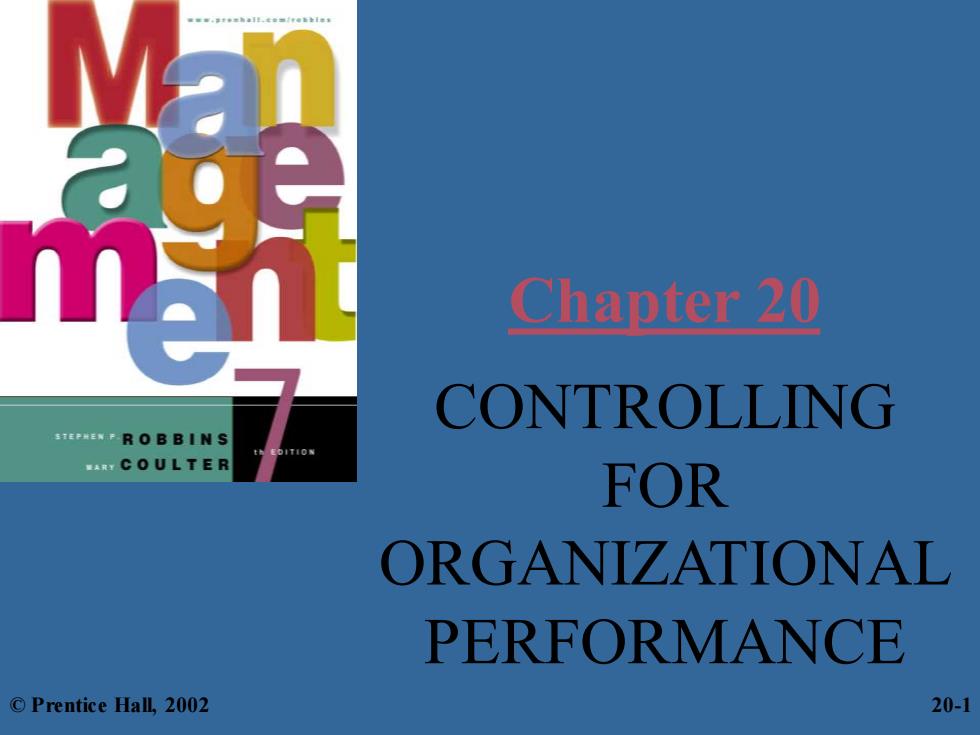
Ma Chapter 20 CONTROLLING ROB B I N S COULTER FOR ORGANIZATIONAL PERFORMANCE ©Prentice Hall,2002 20-1
Chapter 20 CONTROLLING FOR ORGANIZATIONAL PERFORMANCE © Prentice Hall, 2002 20-1
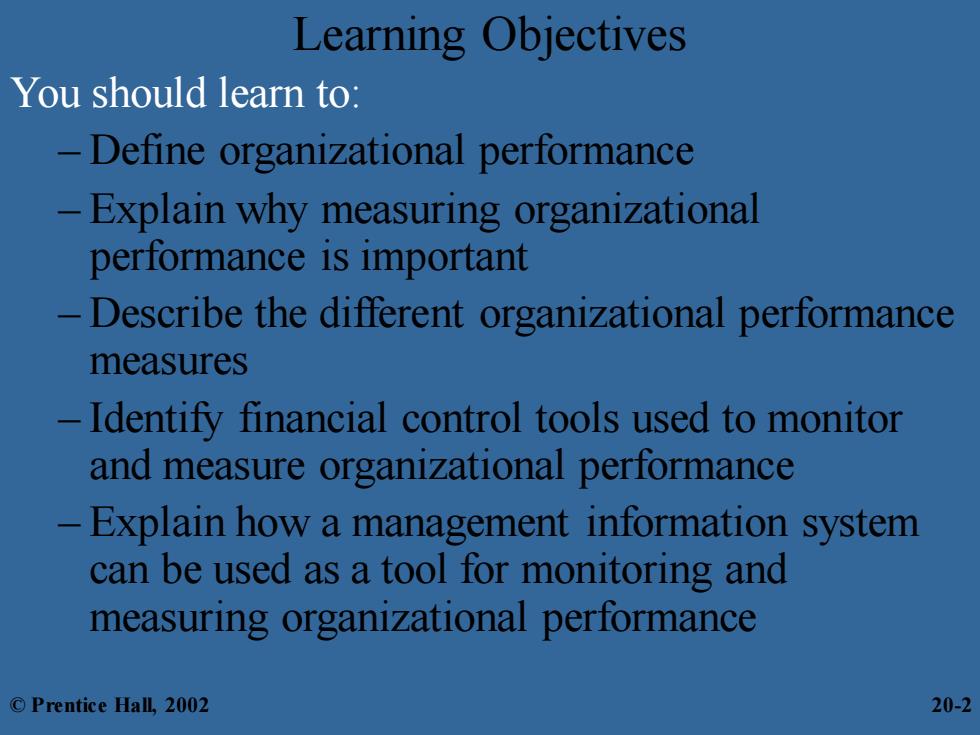
Learning Objectives You should learn to: Define organizational performance Explain why measuring organizational performance is important Describe the different organizational performance measures Identify financial control tools used to monitor and measure organizational performance Explain how a management information system can be used as a tool for monitoring and measuring organizational performance ©Prentice Hall,2002 20-2
Learning Objectives You should learn to: – Define organizational performance – Explain why measuring organizational performance is important – Describe the different organizational performance measures – Identify financial control tools used to monitor and measure organizational performance – Explain how a management information system can be used as a tool for monitoring and measuring organizational performance © Prentice Hall, 2002 20-2
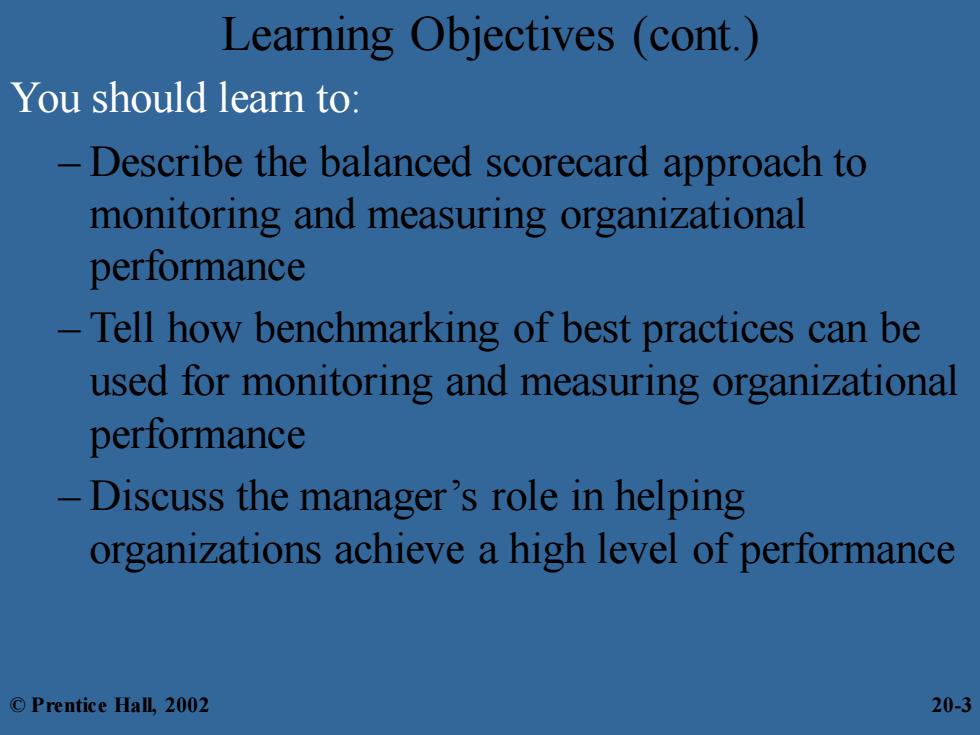
Learning Objectives (cont.) You should learn to: -Describe the balanced scorecard approach to monitoring and measuring organizational performance Tell how benchmarking of best practices can be used for monitoring and measuring organizational performance Discuss the manager's role in helping organizations achieve a high level of performance ©Prentice Hall,2002 20-3
Learning Objectives (cont.) You should learn to: – Describe the balanced scorecard approach to monitoring and measuring organizational performance – Tell how benchmarking of best practices can be used for monitoring and measuring organizational performance – Discuss the manager’s role in helping organizations achieve a high level of performance © Prentice Hall, 2002 20-3
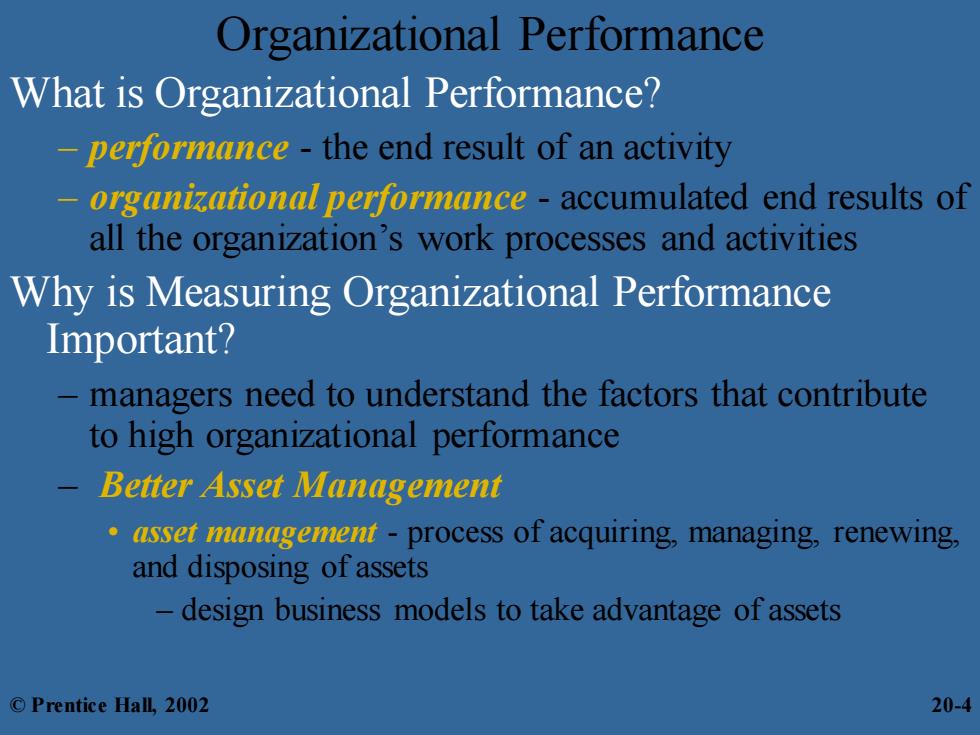
Organizational Performance What is Organizational Performance? performance-the end result of an activity organizational performance accumulated end results of all the organization's work processes and activities Why is Measuring Organizational Performance Important? managers need to understand the factors that contribute to high organizational performance Better Asset Management asset munagement process of acquiring,managing,renewing. and disposing of assets design business models to take advantage of assets ©Prentice Hall,2002 20-4
Organizational Performance What is Organizational Performance? – performance - the end result of an activity – organizational performance - accumulated end results of all the organization’s work processes and activities Why is Measuring Organizational Performance Important? – managers need to understand the factors that contribute to high organizational performance – Better Asset Management • asset management - process of acquiring, managing, renewing, and disposing of assets – design business models to take advantage of assets © Prentice Hall, 2002 20-4
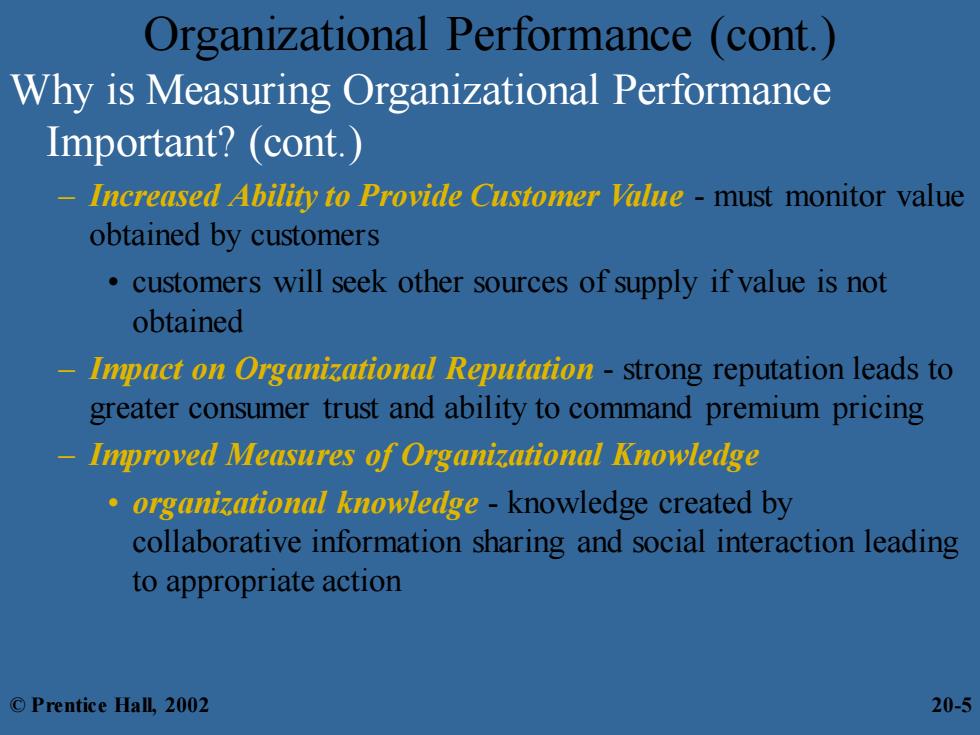
Organizational Performance (cont.) Why is Measuring Organizational Performance Important?(cont.) Increased Ability to Provide Customer Value-must monitor value obtained by customers customers will seek other sources of supply if value is not obtained Impact on Organizationall Reputation strong reputation leads to greater consumer trust and ability to command premium pricing Improved Measures of Organizational Knowledge organizational knowledge-knowledge created by collaborative information sharing and social interaction leading to appropriate action ©Prentice Hall,2002 20-5
Organizational Performance (cont.) Why is Measuring Organizational Performance Important? (cont.) – Increased Ability to Provide Customer Value - must monitor value obtained by customers • customers will seek other sources of supply if value is not obtained – Impact on Organizational Reputation - strong reputation leads to greater consumer trust and ability to command premium pricing – Improved Measures of Organizational Knowledge • organizational knowledge - knowledge created by collaborative information sharing and social interaction leading to appropriate action © Prentice Hall, 2002 20-5
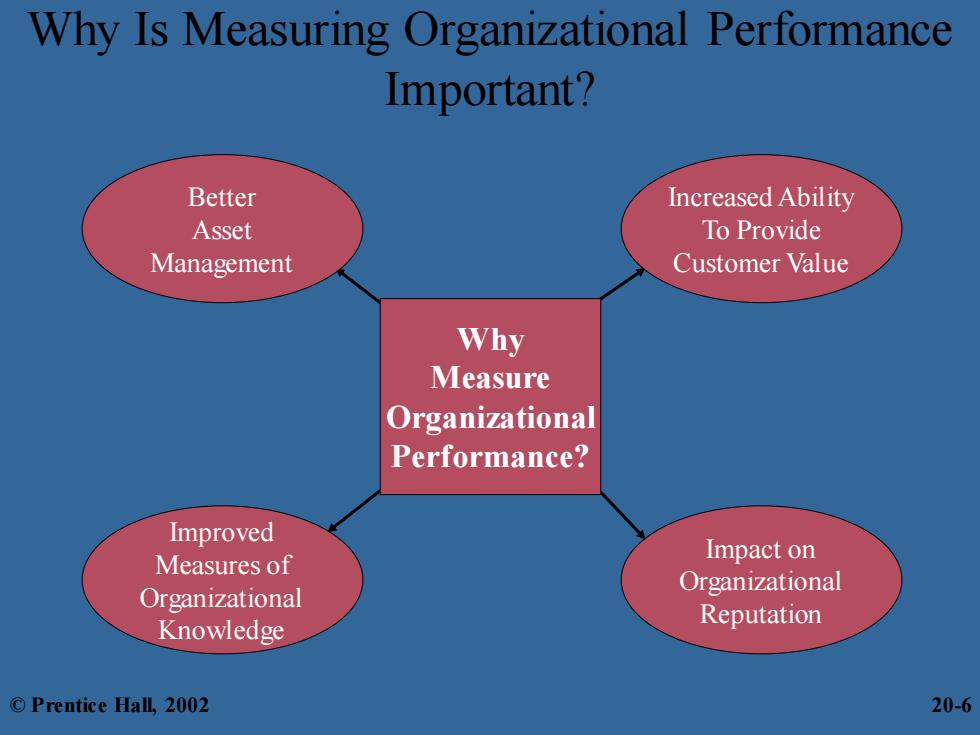
Why Is Measuring Organizational Performance Important? Better Increased Ability Asset To Provide Management Customer Value Why Measure Organizational Performance? Improved Measures of Impact on Organizational Organizational Knowledge Reputation ©Prentice Hall,2002 20-6
Why Is Measuring Organizational Performance Important? Increased Ability To Provide Customer Value Better Asset Management Impact on Organizational Reputation Improved Measures of Organizational Knowledge Why Measure Organizational Performance? © Prentice Hall, 2002 20-6
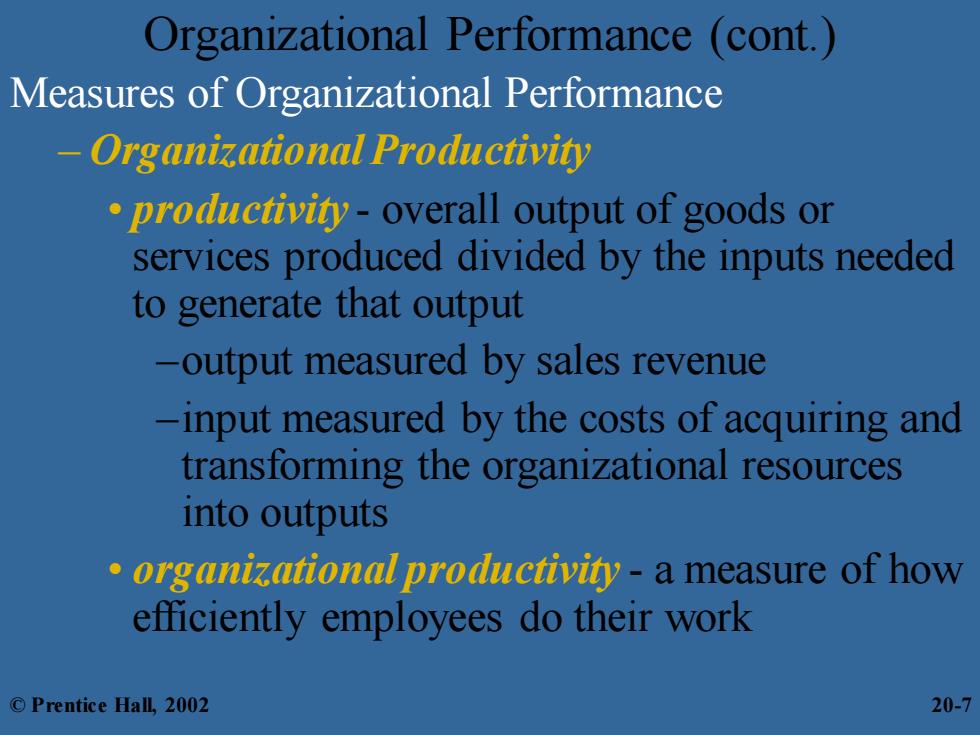
Organizational Performance (cont. Measures of Organizational Performance Organizational Productivity produetviny-overall output of goods or services produced divided by the inputs needed to generate that output -output measured by sales revenue input measured by the costs of acquiring and transforming the organizational resources into outputs organizational productivity-a measure of how efficiently employees do their work ©Prentice Hall,2002 20-7
Organizational Performance (cont.) Measures of Organizational Performance – Organizational Productivity • productivity - overall output of goods or services produced divided by the inputs needed to generate that output –output measured by sales revenue –input measured by the costs of acquiring and transforming the organizational resources into outputs • organizational productivity - a measure of how efficiently employees do their work © Prentice Hall, 2002 20-7

Organizational Performance (cont. Measures of Organizational Performance (cont.) -Organizational Effectiveness -measure of how appropriate organizational goals are and how well an organization is achieving those goals there are different models of effectiveness Industry Rankings-numerous industry and company rankings rankings determined by specific performance measures examples include Fortune,Business Week,Forbes, and Industry Week ©Prentice Hall,2002 20-8
Organizational Performance (cont.) Measures of Organizational Performance (cont.) – Organizational Effectiveness - measure of how appropriate organizational goals are and how well an organization is achieving those goals • there are different models of effectiveness – Industry Rankings - numerous industry and company rankings • rankings determined by specific performance measures • examples include Fortune, Business Week, Forbes, and Industry Week © Prentice Hall, 2002 20-8

Types Of Performance Control Tools Financial Information Controls Controls Performance Control Tools Benchmarking Balanced Best Practices Scorecard Approach Approach ©Prentice Hall,2002 20-9
Types Of Performance Control Tools Information Controls Financial Controls Balanced Scorecard Approach Benchmarking Best Practices Approach Performance Control Tools © Prentice Hall, 2002 20-9
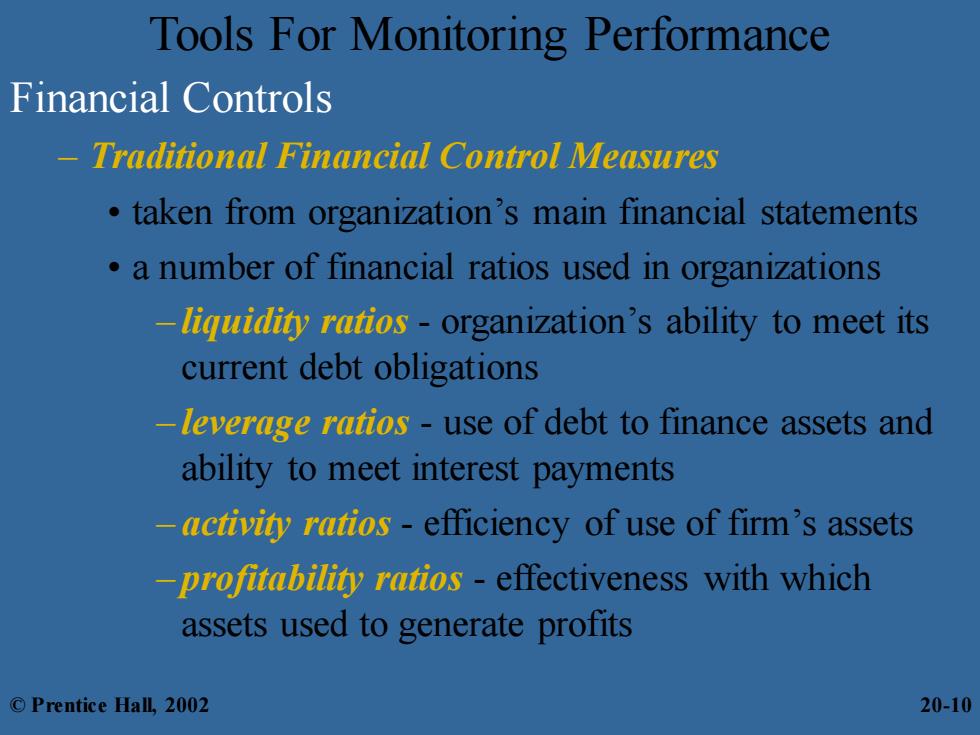
Tools For Monitoring Performance Financial Controls Traditional Financial Control Measures taken from organization's main financial statements a number of financial ratios used in organizations -liquidiny ratios-organization's ability to meet its current debt obligations -leveruge rutios use of debt to finance assets and ability to meet interest payments activiny ratios-efficiency of use of firm's assets -profabilliy ratios-effectiveness with which assets used to generate profits ©Prentice Hall,2002 20-10
Tools For Monitoring Performance Financial Controls – Traditional Financial Control Measures • taken from organization’s main financial statements • a number of financial ratios used in organizations – liquidity ratios - organization’s ability to meet its current debt obligations – leverage ratios - use of debt to finance assets and ability to meet interest payments – activity ratios - efficiency of use of firm’s assets – profitability ratios - effectiveness with which assets used to generate profits © Prentice Hall, 2002 20-10